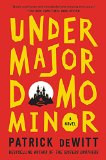Summary | Excerpt | Reading Guide | Reviews | Beyond the book | Read-Alikes | Genres & Themes | Author Bio

Glen Duncan's novel, The Last Werewolf, is a surprisingly literary, deeply introspective, and extremely well-written novel about Jake Marlowe - the last surviving werewolf on earth - who is being hunted by members of the WOCOP (World Organisation for the Control of Occult Phenomena). After nearly two hundred years of running, hiding, and brutally killing, Jake is tired and doesn't see the point in fighting the fight any longer.
He's had years to consider his life, to contemplate the meaning of his existence - his loneliness, his inescapable drive to kill, the cyclical repetition of history - and his conclusions are both compelling and absolutely gorgeous. Dark and dismal, sure, but gorgeous none the less. Marlowe's internal dialogue is written with great care and control, and Duncan describes his thoughts and feelings with such distinction - metaphors you never knew existed - you'll find yourself reading passages over and over again. (And here we were on the bed together, warm as a pot of sunlit honey... Sadness went through me like a muscle relaxant.)
The transformation scenes are delightfully physical and voyeuristic in nature (the aching shoulders, writs and teeth, the "wolf remnants wriggled under my human skin like rats in a sack"), and they're driven by an uninhibited, raw sexual energy that is undeniably steamy. But they are also much more than that. Throughout his metamorphoses, Marlowe questions the existence of God and philosophizes about the nature of being, referencing classic literature, poetry as well as pop culture throughout.
He takes joy in the pure freedom of becoming an animal: He ran. I ran. We ran. All persons, the plural and two singulars justified. They grappled, sheared off, bled into each other, enjoyed moments of unity. Out of the woods moonlight painted me nose to rump, a palpable lick of infinitely permissive love that asked of me only that I be completely myself.... At moments the triumvirate dissolved and was neither him nor I nor us but an unthinking aspect of the night, inseparable from the wind in the grass or the odours in the air, a state - like getting lost in music - recognisable only by coming out of it... It is also highly satisfying learning how Duncan defines rules of how werewolves work: silver bullets are dangerous, werewolves can't talk in monster form, eaten souls and personalities remain present within the werewolf's consciousness, werewolves can't reproduce...
However, the plot occasionally feels slow and repetitious, as if it's a secondary vehicle that simply allows us to enter Marlowe's thoughts, which is just ok. And there are a few plot points that are ridiculous enough to take you out of the story, even if only momentarily. For these reasons, The Last Werewolf lingers in the space between classic horror literature (e.g. Dracula and Frankenstein) and pop teen monster reads. Also, at times it feels as though Duncan is writing because he's in love with his own words, but, really, it's ok because they're so interesting and well put that I imagine most readers will be too.
Withall, Duncan's The Last Werewolf is a highly intelligent, sensual, and well-written novel that, with some interesting twists and unexpected turns, is likely to keep you engrossed throughout. I highly recommend this book to fans of classic horror novels and to people who can appreciate that perfect combination of poetic introspection, gothic darkness, and juicy gore.
Publishing in June 2012: The follow up to The Last Werewolf, Talulla Rising
![]() This review was originally published in The BookBrowse Review in July 2011, and has been updated for the
May 2012 edition.
Click here to go to this issue.
This review was originally published in The BookBrowse Review in July 2011, and has been updated for the
May 2012 edition.
Click here to go to this issue.

If you liked The Last Werewolf, try these:

by Saul Black
Published 2016
In their isolated country house, a mother and her two children prepare to wait out a blinding snowstorm. Two violent predators walk through the door. Nothing will ever be the same.

by Patrick deWitt
Published 2016
A love story, an adventure story, a fable without a moral, and an ink-black comedy of manners, Undermajordomo Minor is Patrick deWitt's long-awaited follow-up to the internationally bestselling and critically acclaimed novel The Sisters Brothers.
Your guide toexceptional books
BookBrowse seeks out and recommends the best in contemporary fiction and nonfiction—books that not only engage and entertain but also deepen our understanding of ourselves and the world around us.